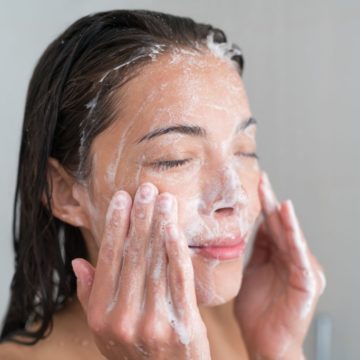
- Your 20s or 30s are the best time to prevent skin aging.
- Sun exposure can severely damage your skin.
- Wearing sunscreen every day is crucial for preventing premature skin aging.
While signs of aging may not be pronounced in your thirties, Doris Day, MD, says it’s the prime time to start addressing them.
Here are dermatologist-approved tips to keep your skin looking youthful every decade:
1. Wear sunscreen daily.

Wearing sunscreen should be part of your daily routine, whatever the weather or season is. The American Academy of Dermatology recommends wearing a sunscreen with at least SPF 30 of at and labelled “broad-spectrum”, because it can protect against the UVA and UVB rays from the sun that cause aging effects on the skin. The sunscreen should also be water-resistant. Products with the ingredients avobenzone, mexoryl, zinc oxide, or titanium dioxide help protect against UVA.
Put on enough sunscreen on your neck, hands, and arms, and reapply it after sweating, swimming, or being exposed to direct sun. Dermatologist Heidi Waldorf, MD, says you won’t get much protection if you don’t put on enough or use it often.
2. Avoid tanning.

Waldorf says the ultraviolet radiation you get from tanning will make your skin look worse, cause skin discoloration, and damage your elastin and collagen. Day recommends using sunless tanners instead, which come in sprays, gels, creams, lotions, and wipes. However, Day reminds us that these products don’t protect you from the sun’s damaging rays, so you still need to wear sunscreen.
3. Wear sunglasses.

Sunglasses protect your eyes and the delicate skin that surrounds them from sun damage. It also prevents wrinkles because you don’t have to squint all the time.
4. Wear hats, visors, and sun-protective clothing.

Besides wearing sunscreen, wearing hats with a broad brim, or using a parasol, can also keep the sun off your skin. If you often stay outdoors, consider buying sun protection clothing. These clothes have been treated to provide at least SPF 30 protection against UVB and UVA throughout the day.
5. Don’t smoke.

Smoking constricts blood vessels that supply oxygen and nutrients to your skin and speeds up collagen breakdown. People who smoke are prone to wrinkles, and their nails and fingertips will turn yellow in time.
6. Limit alcohol consumption.

Too much alcohol dehydrates your skin, makes your blood vessels dilate and puts you at risk of broken blood vessels and rosacea, a skin disorder that causes redness and tiny pimples.
7. Maintain a healthy weight, and get help for eating disorders.

Anorexia and bulimia are two eating disorders that can stress and damage your whole body. These conditions may even be life-threatening. People without eating disorders who go through periods of “yo-yo” dieting repeatedly gain and lose weight, which can stretch the skin and cause it to sag.
8. Use products with retinoids or retinol.

Retinoids are prescription medications that can help the skin look younger, while retinol is a weaker form sold over-the-counter. If you’re pregnant or are trying to conceive, ask your doctor before using these products. Women can start using retinoids even in their early twenties, says Waldorf, While Day recommends using retinol in their twenties as an anti-aging strategy to prevent aging. But, if you’re in your 20s and 30s and your skin doesn’t have a lot of sun damage, you can hold off on retinoids until later.
9. Consider antioxidants and peptides.
Waldorf says the most basic skincare routine for women in their twenties is washing with a gentle cleanser and applying a moisturizer, with retinoid if needed, at night. You can also use serums with grape seed extract, resveratrol, green tea, and vitamins A, C, and E, which contain peptides and antioxidants. Waldorf recommends applying antioxidant products in the morning before using a sunscreen moisturizer to prevent skin damage.
10. Consider treatments for skin damage.

Consider microdermabrasion, light peels, or laser treatments to improve your skin appearance if you have a lot of sun damage or acne scars. Waldorf also reminds not to pick on acne to prevent scars.
Via WebMD

